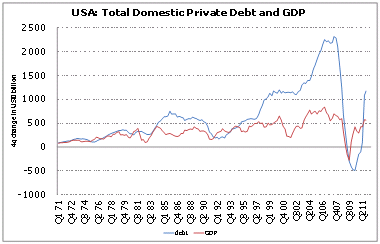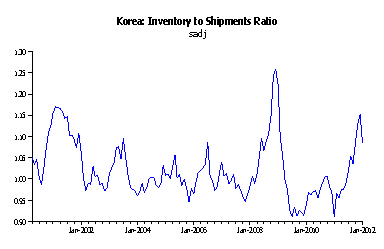Tyndall: The global economic tour
Over recent months, confidence in the global economy has improved markedly on the back of some seemingly more positive economic data from the production side and, in particular, from the various widely watched industrial surveys, such as the influential German Ifo Index. This improvement in business confidence, coupled with what appears to have been a marked revival in credit growth within the financial markets, has certainly helped asset prices to recover some - or in some cases all - of their lost ground from 2011.
Monday, April 2nd 2012, 11:44AM
by Andrew Hunt
In fact, although we find that the number of "players" within the global financial system has been dramatically reduced over recent years, it seems that the financial system's ability to create leverage appears undiminished and by some measures we can suggest that credit growth within the financial markets has been growing at rates which seem worryingly reminiscent of the mid-2000s credit excesses. Hence we would attribute much of the recent improvement in financial markets to this flow of funds, rather than necessarily an improvement in economic fundamentals.

While this credit-fuelled rise in asset prices may have some positive wealth effects for households, which may have been the intention of the world's central bankers who have allowed the new credit boom to evolve, we also suspect that the credit institutions' apparent concentration on lending to other financial institutions is to an extent crowding out real world borrowers. Therefore, we are not certain that the credit boom within financial markets is of much real benefit to the wider economies and we certainly doubt the authorities' judgment in allowing us to return to a situation that is reminiscent of what existed just prior to the Global Financial Crisis.
We would also note that this return to boom-like conditions within capital markets has not been limited to the major markets; the funds generated by this new credit boom have been flowing out of the G7 and on into high yielding Southern Hemisphere currencies such as the Australian dollar and also into the emerging markets. Against this background, it is of no surprise to find that the governments within many developing world economies have become concerned over the prospect of being inundated with yet more capital inflows that may cause either their currencies to appreciate or their economies to inflate. Some leaders in the recipient countries have been overtly critical of the impact of the West's latest round of quantitative-easing-style policies and the effects that they might have on the less-developed financial systems in the emerging markets with the result that they are now actively considering the imposition of further controls on the movement of international capital.
For our part, we suspect that the EM world may find that the problem of excessive capital inflows soon dissipates of its own accord. Critical to the level of credit and flows between the different components of the financial system in both the developed and developing worlds, is the issue of confidence in one's financial counterparties. In reality, there are perhaps now only six or seven large providers of credit left within the financial system (that is, a small number of "mega banks") and these institutions are acutely aware that a new global slowdown and/or further problems in the Euro could cause financial stress levels to rise once again. At this point, we suspect that these lenders would begin to fear a rise in counterparty risks, with the result that they would tend to curtail their lending activities once again, with a negative impact on financial market liquidity and momentum. Over recent weeks, some signs have emerged that this has already begun to occur and we suspect that the recent increase in sovereign bond yields is a reflection of this development.
Certainly, it would seem that confidence in both the Euro and the global economic recovery will be key to determining whether liquidity trends continue to improve (and thereby continue to support both global equity and bond prices) or whether liquidity ebbs away with a negative impact on asset prices in general.
With regard to the outlook for the global economy, we suspect that confidence is indeed about to slip. Although businesses have become more confident of late, this improvement in sentiment on the production side of the economies has not been matched by an improvement in actual consumer expenditure trends. Hence, the extra production and subsequent rise in employment that has occurred in some countries over the last two or three months, has merely resulted in a rising level of inventories in companies' warehouses. Therefore, we can expect companies to soon begin attempting to reduce their inventories once again and, if this does not occur via a rise in sales, which seems unlikely to happen given the still modest household income and spending trends, then this will have to be achieved by companies reducing their production. Such an event will tend to undermine confidence in the global recovery story.

By region, it would seem that Europe and Asia are particularly badly affected by this inventory accumulation problem. Asian companies are suffering from not only the sluggish economic situation globally but also by the onset of what appears to be a quite marked slowdown in China. We suspect China's economy is now only growing at around a 4% rate (a third of its rate in 2010) and unfortunately we see little scope for the Chinese authorities to ease to reverse this slowdown as a result of their continuing supply-side bottlenecks, high underlying inflation and weakening balance of payments position. Given China's and, for that matter, India's problems, we doubt that this will be a particularly good year for the Asian economies.
The US should however fare rather better. US manufacturers are competitive and their market share is rising, as the major retail companies increasingly turn back from Asia and return home as they experience not only rising costs in Asia but also become more fearful of potential supply chain disruptions, such as those that followed Japan's tragic earthquake. We expect the US economy to be amongst the best performing this year, although even here growth will be moderate rather than exceptional. Japan's economy should also expand this year, albeit only on the back of the earthquake reconstruction effort. Elsewhere in the Japanese economy, private sector trends seem weak and although the expected decline in the Yen may provide some comfort to exporters, problems in the domestic bond markets and domestic economy generally may constrain overall activity rates. We would be especially cautious over the outlook for Japanese government bonds over the next year or so as the economy's weak performance continues to undermine the government's tax raising efforts.
In Europe, there are hopes of an economic recovery that we suspect are quite unjustified. We would go so far as to suggest that the need to reduce costs and prices in the periphery to restore the area's basic competitiveness are creating economic depressions of which the general populations are becoming increasingly tired. Consequently, we expect that popular opinion will continue to turn increasingly against the Euro over the coming months and that this will tend to unwind some of the improvement in market confidence in the project that occurred following the ECB's aggressive provision of a trillion Euros of emergency aid to the system in the wake of the recent crisis.
We would go so far as to suggest that, although the ECB may have stabilised the banking system through its recent largesse, by failing to foster an economic recovery the ECB has not succeeded in saving the Euro project in the eyes of the masses and hence politics will continue to undermine the project - perhaps fatally - over the next few years. Unfortunately, the recent Greek and Spanish civil unrest seems only likely to escalate whilst deflation and depression remains the EU's policy prescription for their countries and ultimately this will cause more political instability in the EUR project, we suspect.
Against this background, we expect financial markets to be volatile. In the near term, growing uncertainty over the Euro and the potential for disappointment with regard to the state of the global real economy may lead to a loss of confidence and an increase in fears over counterparty risks within the financial system. Such events can be expected to weigh heavily on all asset classes and perhaps leave the US dollar as the safe haven currency almost by default.
However, if markets and the global economy do deteriorate as expected, then we can expect perhaps another round of Quantitative Easing by the Federal Reserve and perhaps even by Japan and Europe. Markets might then welcome such an easing and rally again but the key theme for us over the next few quarters is likely to be one of volatility as the world's monetary authorities try to keep the latest incarnation of the financial sector credit boom alive even as fundamental conditions within the real economies remain challenging.
Just as 2011 ultimately proved to be, despite the optimism that had prevailed in the opening months of the year, 2012 may yet turn out to be another interesting year.
Andrew Hunt International Economist London
| « Tyndall Monthly Commentary | Harbour:The methadone approach to market recovery » |
Special Offers
Commenting is closed
| Printable version | Email to a friend |









